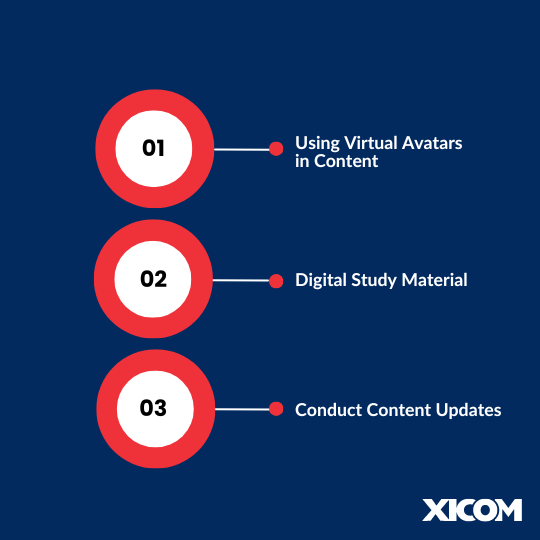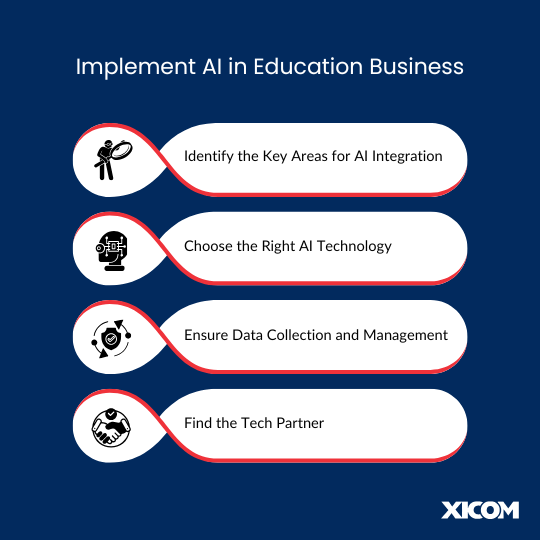Nov 22, 2024 Artificial Intelligence
AI in Education Industry: Use Cases, Benefits and Cost
Nov 22, 2024 Artificial Intelligence
Table of Contents
Nov 22, 2024 Artificial Intelligence
Looking to implement AI in education? But how can it help you reshape the education system?
Well, applying AI in education can improve learning outcomes and support teachers to innovate educational practices to make the overall learning experience more engaging and overwhelming for the students. Right from automatic assignment grading systems to tailored curriculums, there are many ways AI is transforming the education system.
And the noticeable example of adopting AI in education is ChatGPT!
89% of students are using ChatGPT for their homework, indicating the widespread reliance on AI tools for academic tasks.
Undoubtedly, AI has the potential to revolutionize the education system and quickly transform it from a “System Focused on Memorizing Facts” into one that allows students to quickly adapt the concept with a personalized learning approach. And the way AI technology is growing, it is increasingly accessible for educators to deploy AI tools in their classrooms and provide innovative yet engaging learning experiences.
According to the Grand View Research reports, the global adoption rate of AI in education is expected to increase at a CAGR of 36% from 2022 to 2030.
Whether you are planning to create, upgrade, or migrate your education learning model to next-gen AI platforms and looking to hire a mobile app development company, then Xicom can be your trusted tech partner, enabling you to unlock new opportunities and experiences. Let’s connect now for details.
Education institutions from all across the world have recognized the impact of Generative AI on the learning process. In the last few years, it transformed how educators tailor programs and how students approach their assignments.
It has been observed that Gen AI is poised to reshape the education industry by creating intelligent, adaptive learning companions that enhance the student experience.
You don’t have to take our word, here is the market overview revealing all the stats and facts about using AI in education:
So if you are inspired to use AI in the education industry, then this would require you to hire an AI app development company that can help you implement the AI capabilities. But before that, you need to understand how AI can be used in the education business…
AI in the education industry has streamlined various tasks and made learning easy and engaging. However, the ultimate impact of AI in education will depend upon the skills of software outsourcing development companies and how it turns out.
Here are the 5 prominent AI use cases in education that represent how artificial intelligence has revolutionized learning and educational practices…
Education learning is different for every different student. Every student has their way of adapting concepts, some may quickly grasp it, whereas some need more detailed explanations.
This is where conventional learning systems fail to meet different learning requirements of the students and that’s where AI in online education takes the central stage!
According to the survey reports, AI content improved the test results for 62% of respondents because the ultimate role of AI in education is to make effective use of data.
Generative AI, gathers information on academic performance, learning styles, and student’s strong and weak points. By keeping all such parameters in mind, it helps develop a teaching strategy that adapts to the personal needs of the students.
Considering different learning requirements, AI helps translate concepts into text, video, and audio formats and provides high-quality study material to the students.
Creating engaging content is surely a challenging task but AI is one of the most powerful tools to be used in the education industry. With this technology, educators can create smart content for convenient teaching and learning practices. Here’s how it works:

Where traditional education is all about textual theories and making learning difficult for students, AI content helps you use Virtual Avatars that can speak multiple languages and offer personal education for students worldwide.
All that is required is to upload a photo of a real person or use one of the existing profiles. Harvard University adopts this approach first and tailors the learning experience.
Using AI for education can help generate bit-size learning materials that remain in digital formats. This way, students and experts can leverage the entire study material without taking up much space in the system. Moreover, these learning materials are accessible from any device, anywhere, and anytime.
The custom AI app in education allows users to create and update content frequently to keep the study material updated with time. The users also get notified whenever new information is added to any lesson.
According to the reports, education is one of the top 5 industries that use chatbots in their work and 69% of users are satisfied with the Chatbot interactions.
Source: outgrow.co
Integrating a chatbot into your existing educational website or app can be simple and easy. All that you need is to hire an AI developer who can easily understand your existing system, able to train the algorithms of the AI model, to make the chatbots work as per your requirements.
The intelligent chatbots provide detailed information about the different aspects of the study process. However, modern Chatbot solutions can help students with course registration, payment processing, extracurricular activities, or selecting the best-fitted courses.
Instead, let your students wait for longer to get connected with the counselors to resolve their queries. The widespread implementation of AI in education will provide support whenever students need it.
It offers great help, all thanks to its characteristics:
Did you know that, 60% of workers surveyed estimate they could save six or more hours a week or almost a full workday- if the repetitive aspects of their jobs were automated?
Source: smartsheet.com
With AI implementation in the education sector, teachers can spend less time on administrative tasks and more time on teaching. AI and ML in education can handle everything from automating grading assignments to organizing research papers. This frees up teachers to create personalized learning experiences and provide more individual attention to students.
Bringing AI into the education system can make life easier for teachers and benefit students. By automating routine tasks, AI creates a more efficient and productive learning environment. This is why schools and businesses are rapidly turning to AI development services to improve outcomes.
As an educator, planning and setting a yearly curriculum is one of the most challenging tasks. This is where leveraging AI to create personalized learning paths.
Wondering how it works?
For example, AI algorithms analyze student performance data, identifying individual strengths and weaknesses for teachers to adjust the curriculum accordingly.
Moreover, AI can provide real-time feedback on the effectiveness of teaching practices and curricular materials. With this data-driven approach, educators can refine their curriculum dynamically.
Surely, reading these use cases of artificial intelligence in the education sector will inspire you to invest in AI-powered education apps. But how can it benefit?
With the various use cases of AI in the education industry, it offers various benefits and redefines the way students learn and educators teach. Here are some key benefits of using AI in the education sector for students, educators, parents, and school management.
Unlike traditional education systems, school management can leverage AI-driven insights to access data-backed analyses of student performance, enrollment trends, and curricular opportunities and can make better decisions faster.
With these benefits, it is clear that the scope of AI in the education sector keeps expanding and meeting modern education needs. But how to implement it correctly?
With the availability of AI app development companies, implementing AI into education apps or creating AI-based Education is no longer a challenging task. But still, to make the development process smooth, you need to create a roadmap and plan things rightly to avoid hurdles. So here’s how you can implement AI in education business:

Identify what you are trying to achieve through AI-Integration. Whether you are trying to deliver a personalized learning experience, automating administrative tasks, providing better engagement tools, or using it for data analytics?
Before you get straight to hire a software developer, here you need to understand the key areas of AI integration:
There are several AI tools available to access, but the ultimate choice of the technology greatly depends upon your requirements.
Here’s how:
AI models are all about algorithms. And the performance of these AI models is based on the data you use to train them. So collect data responsibly from various sources, while adhering to privacy regulations. Use AI to analyze student behavior, preferences, and performance metrics.
To create a brilliant AI-based education app, you need to collaborate with an AI development company to customize solutions that align with your business model.
Xicom is at the forefront of providing end-to-end AI app development services following the collaborative approach. Our team works closely with clients to make sure that they create solutions addressing the significant challenges of their businesses. But we recommend beginning the process by booking a free slot for a free consultation, which enables us to understand your requirements and help us to provide real estimations.
Read More: 115+ Top Mobile App Ideas in 2025 For Startups, Entrepreneurs etc.
At the end of this blog, it is fair enough to say that AI is transforming education businesses and discovering potential opportunities for aspiring entrepreneurs. 93% of higher-end institutions are already using video-based learning solutions and looking forward to improving the learning experience by adopting AI capabilities. So are you also ready to embrace the potential of artificial intelligence in your education business?
Incorporating Gen AI into education represents a transformative shift in how learning and teaching are approached, therefore, it requires you to hire a mobile app developer who can create solutions that deliver personalized and enhanced teaching and learning experiences. At Xicom, we have a dedicated team of developers who can go above and beyond to alleviate the experience by automating tasks like grading assignments, classroom management, and more.
So if you are all set to create or upgrade your education app using AI technology, then you can contact us or drop a query below.
Here we have gathered additional information related to using AI in education applications and how it will impact future education.
Xicom is one of the leading software development companies, offering AI education app development services for over a decade. We have a dedicated team of AI developers who help integrate AI agents into education businesses or institutions through APIs or AI-powered platforms that connect with existing learning management systems (LMS). It creates possibilities for real-time data exchange for personalized learning experiences and automotive administrative tasks.
The cost to integrate AI in education apps depends upon the complexity of your requirements, features and functionality, UI/UX design, app development team, and location. Still, the average calculation says that it will range between $20,000 to $35,000+, depending upon your business requirements.
The common and most popular use cases of AI in education are – it helps create engaging and interactive content such as quizzes, assignments, and simulations and is more tailored to individual students’ needs and learning patterns.
AI can resolve various modern education challenges such as staying updated with modern learning and teaching patterns, keeping the learning system ethical and transparent, allowing remote learning, making learning and teaching more engaging, allowing students to get 24*7 support, and more.